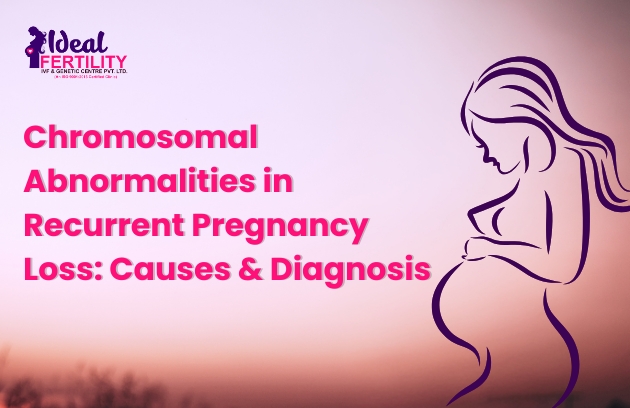Table of Contents
Recurrent pregnancy loss is a heartbreaking condition that affects many couples trying to conceive. Defined as two or more consecutive miscarriages, RPL can be caused by multiple factors, with chromosomal abnormalities being one of the most common reasons. These genetic defects can prevent an embryo from developing properly, leading to pregnancy loss.
Advancements in Chromosome Analysis (गुणसूत्र विश्लेषण) have enabled specialists to identify these abnormalities, allowing for better diagnosis and treatment strategies. By understanding the causes and diagnosis of chromosomal abnormalities, couples experiencing recurrent pregnancy loss can take informed steps toward achieving a successful pregnancy.
Causes of Chromosomal Abnormalities in Recurrent Pregnancy Loss
Chromosomal abnormalities occur when there is an error in the number or structure of chromosomes, which carry genetic information. These abnormalities can arise during the formation of sperm or eggs or during early embryonic development with its causes as:
- Aneuploidy
- Occurs when there is an extra or missing chromosome, leading to conditions such as:
- Trisomy 21 (Down syndrome)
- Trisomy 18 (Edwards syndrome)
- Monosomy X (Turner syndrome)
- Occurs when there is an extra or missing chromosome, leading to conditions such as:
- Structural Chromosomal Rearrangements
- Some parents may carry balanced translocations or inversions, which do not affect them but can lead to unbalanced chromosome inheritance in their offspring, causing miscarriage.

- Single-Gene Disorders
- Some inherited conditions, like thalassemia and sickle cell anemia, can affect fetal viability and increase miscarriage risk.
- Maternal Age Factor
- The risk of chromosomal abnormalities increases with maternal age, especially after 35 years, as egg quality declines.
Chromosome Analysis: A Key Diagnostic Tool
Chromosome Analysis, also known as karyotyping, is a fundamental test used to identify chromosomal abnormalities in couples experiencing recurrent pregnancy loss.
How Chromosome Analysis Works?
- A blood sample is collected from both partners.
- The cells are cultured and analyzed under a microscope to detect numerical or structural chromosome abnormalities.
- If abnormalities are found, genetic counselling is recommended to discuss reproductive options.
How Chromosome Analysis Helps in RPL Cases?
Chromosome Analysis involves studying an individual’s chromosomes to detect structural defects, aneuploidy or other genetic issues. It is particularly useful in cases of:
- Repeated miscarriages with unknown causes
- A history of genetic disorders in the family
- Unsuccessful IVF attempts
- Previous pregnancies with chromosomal abnormalities
Who Should Consider Chromosome Analysis?
- Couples with two or more consecutive miscarriages.
- Individuals with a family history of genetic disorders.
- Parents who have had a child with Down syndrome or other genetic conditions.
- Couples undergoing IVF treatment (आईवीएफ उपचार) to ensure healthy embryo selection.
Prenatal Diagnosis of Thalassemia and Sickle Cell Anemia
For couples at risk of passing on thalassemia major or sickle cell disease, prenatal testing is crucial to determine whether the fetus has inherited these conditions.
How Prenatal Diagnosis is Performed
- Chorionic Villus Sampling (8-10 weeks)
- A small sample of tissue is taken from the placenta to analyze the baby’s genetic material.
- Amniocentesis (11-14 weeks)
- A sample of amniotic fluid is collected to detect genetic disorders.
Advanced Molecular Techniques for Prenatal Diagnosis
- Polymerase Chain Reaction: Identifies genetic mutations linked to inherited disorders.
- Microarray Analysis: Detects small chromosomal deletions or duplications.
- Next-Generation Sequencing: Provides a highly detailed genetic profile of the foetus.
Role of Fertility Clinics in India in Managing Recurrent Pregnancy Loss
A fertility clinic (प्रजनन क्लिनिक) in India plays a crucial role in diagnosing and treating recurrent miscarriages. Fertility specialists use advanced genetic testing and assisted reproductive techniques to improve pregnancy outcomes.
Services Offered by Fertility Centers in India
- Preimplantation Genetic Testing (PGT):
- Screens embryos for chromosomal abnormalities before implantation in IVF treatments.
- Genetic Counseling:
- Helps couples understand their genetic risks and explore reproductive options.
- Customized Fertility Treatments:
- Personalized treatment plans based on chromosomal analysis results.
Conclusion
Chromosomal abnormalities are a leading cause of recurrent pregnancy loss, but early detection and diagnosis can significantly improve pregnancy success rates. Chromosome Analysis and molecular techniques provide precise insights into genetic abnormalities, allowing fertility specialists to develop personalized treatment plans.
Couples experiencing multiple miscarriages should consider consulting a fertility consultant or fertility specialist in India to explore genetic testing and advanced reproductive options. With the right medical guidance, they can increase their chances of a healthy and successful pregnancy.
FAQs About Chromosomal Abnormalities (गुणसूत्र संबंधी असामान्यताएं)
Q1. How common are chromosomal abnormalities in recurrent pregnancy loss?
Approximately 50-60% of first-trimester miscarriages are caused by chromosomal abnormalities.
Q2. Can chromosomal issues in parents be treated?
While genetic abnormalities cannot be treated, preimplantation genetic testing (PGT) can help select healthy embryos for implantation.
Q3. What is the accuracy of molecular testing for prenatal diagnosis?
Molecular techniques like PCR, microarray and NGS offer 98-99% accuracy in detecting chromosomal and genetic disorders.
Q4. When should couples consider chromosome analysis?
Couples with two or more consecutive miscarriages, a family history of genetic conditions or previous pregnancies with chromosomal abnormalities should undergo chromosome analysis.
Q5. Where can I get chromosome analysis and genetic screening done?
You can visit a fertility clinic in India or consult a fertility specialist in India for comprehensive genetic testing and reproductive health guidance.


